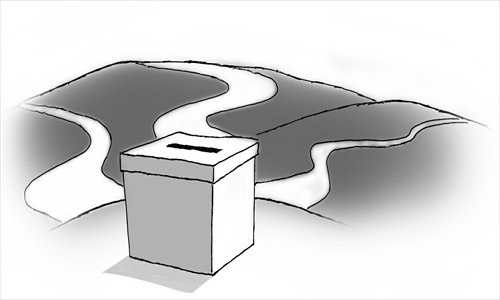Election will test Myanmar reform

Illustration: Liu Rui/GT
Myanmar will be holding national elections in November this year. They will be the first country-wide polls since the start of the reform process in 2011 and are expected to be a major turning point in Myanmar's politics. Seventy-three parties were registered before the April 30 deadline, with another 14 waiting for approval. Of the 73, 53 will compete nationwide while 20 will only have candidates at a regional level.
The Union Election Commission and the government face a number of challenges, starting with the question of a legitimate and internationally recognized outcome. A lot hinges on how the elections will be perceived both domestically and internationally.
In March 2014 the government announced that members of the US-based Carter Foundation and observers from the EU would be invited to monitor the elections. In 2010 foreign observers were not allowed and in the 2012 by-elections only observers from Southeast Asian countries were invited. While the government hopes that this will allay criticisms of ballot stuffing, observers alone won't be able to counter the widely held belief that Aung San Suu Kyi's opposition National League for Democracy (NLD) should win.
In 2010 it was widely felt that not all Union Solidarity and Development Party (USDP) seats were won fairly. However the USDP's strategy of using important local personalities as their candidates, such as the local lawyer or doctor, did pay off in many constituencies as well as the fact that many seats were only contested between the USDP and the pro-junta National Unity Party. In 2015 however, people will have much more choice. This will inevitably lead to a weakening of the USDP's position.
Despite the good prospects for the NLD, Suu Kyi has threatened that the NLD might boycott the ballot. Her main issue remains the 2008 Constitution and in particular article 59F that stops her from becoming president and article 436 that bars any constitutional change without the approval of the military parliamentary candidates. However, given the first-past-the-post system, the NLD is now well placed to take a majority of seats, creating questions as to who in that case would become president.
The rivalry between all those who want the top post represents another challenge. Suu Kyi cannot take on that role until the constitution is amended. Within the circles of the USDP, there is a long standing rivalry between President U Thein Sein and Thura U Shwe Mann, who wanted to be president in 2010, but who was instead made speaker of the house. Recently, he has once again announced his desire to lead the country.
The current Chief of Army Staff, General Min Aung Hlaing has also thrown his hat into the ring, saying that he would serve his country as president if called upon to do so.
Besides, one of the most important challenges is the role of the ethnic political parties that were the first legitimate opposition to the USDP dominated parliaments after the 2010 elections.
Over the last five years their role and significance changed quite dramatically, especially given the government-led peace process with the ethnic armed groups. Their work in the regional parliaments has started to influence policymaking with regard to education and ethnic language use, as well as triggering debates on resource sharing.
Today there are 43 ethnic parties preparing to contest the elections and they represent an important part of modern Myanmar's politics. Recent research has found that their main worry is how the NLD contesting in the ethnic states will affect ethnic parties and how much this will lead to the splitting of the ethnic vote. If the ethnic parties lose the political ground that they have gained in the last few years, ethnic oppression will continue after the next elections, no matter which of the two main Bamar parties wins the elections.
In addition to all the above, there is also the threat of violence, both in the ethnic states where conflict still rages - in particular Kachin and Shan states, but also communal violence in Rakhine state, and other areas where tensions between Buddhists and Muslims are running high. The recent cancellation of all temporary ID cards has led to the disenfranchisement of around 700,000 potential voters, most of them from the Muslim Rohingya minority. Instability of any sort could lead to elections being cancelled in certain areas, affecting the legitimacy and validity of the vote.
If the elections are successful, this will build broad domestic and international confidence in the political and economic reform processes for the future. These elections are therefore a key turning point for Myanmar and the government has to find ways of dealing with these challenges.
The author is an Asia specialist at Technology and Management Practice. She recently published a research report on the role of ethnic parties in the 2015 Myanmar elections. m.lall@ioe.ac.uk